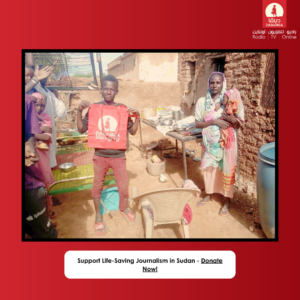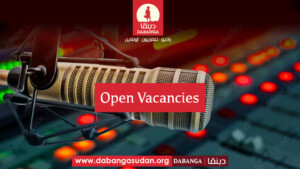Life-saving radio: Reporting on cholera in Sudan
Read how Radio Dabanga affected the lives of Sudanese people during a cholera epidemic in 2016 and 2017.

The effect of Radio Dabanga on lives of Sudanese people became clear when a cholera epidemic broke out in Sudan in September 2016. In the following months, large towns as well as remote areas and camps for internally displaced people faced high numbers of cholera infections.

Doctors and volunteers set-up makeshift isolation wards for patients where they could. Radio Dabanga allocated as much time as possible to broadcast vital information to listeners about the wards, rural hospitals and ways to prevent infection. Cholera spreads easily in areas that lack health facilities and clean water; areas where people cannot buy medicines or oral rehydration solution (ORS).
While the number of deaths is difficult to ascertain under these circumstances, the outbreak claimed at least 940 lives according to the National Epidemiological Corporation in Sudan. Approximately 24,000 people had been infected in nearly a year’s time.
People who grew tired of the government’s inaction started initiatives to raise awareness about cholera, handing-out leaflets or disinfectants. Volunteer Najda Mansour told Radio Dabanga in 2017: “Initiatives […] bridge the gap left by poor health care provided by state and federal health ministries. The teams visit homes, mosques, markets and more to provide information about avoiding cholera and how to deal with infected people.”

Health specialists criticized the government’s denial of the outbreak.

Radio Dabanga’s broadcasts became all the more important when the Sudanese government insisted that the disease that ravaged parts of Sudan in 2017 was not cholera. High-ranking government officials used the medical term “acute watery diarrhea” when talking about the issue. This term has been widely disputed by health workers in the country and epidemiology specialists, who found that the disease in fact was cholera.
Numerous journalists, doctors, and politicians were detained or warned not to speak about cholera, in an attempt by the government to censor cholera information from appearing in the public agenda and drawing international attention to the health issue.
Radio Dabanga has always endeavored to promote transparency in Sudan. The team believes that the people in Sudan have the right to access reliable news. News that is made for and by the Sudanese: without the help of medical sources and volunteers, Dabanga would not have been able to adequately report news about the cholera outbreak to the people in Sudan.
Right now, Radio Dabanga needs your help to stay on air and reach listeners with life-saving information. Support the radio station and share this story online, or sponsor shortwave airtime for Radio Dabanga on GoGetFunding. Help keep these radio programs on air!











 and then
and then